- Home
- Kasie West
Love, Life, and the List Page 2
Love, Life, and the List Read online
Page 2
I shuffled down the hall into my bathroom, where I nearly tripped over my mom, who was lying on the floor. The cupboards were open and shampoo bottles and hairspray and window cleaner lined the floor next to her. In one hand she held a flashlight, which she was pointing under the sink, and in her other hand was a flyswatter.
“Uh. What are you doing?” I asked.
“Have you ever heard of a brown recluse?”
“The spider?”
“Yes. I was just making sure you didn’t have one under your sink.”
“Did you see a web under there? Or is there a sucked-dry mouse corpse?” I squatted down to get a better look and sent a bottle of conditioner toppling.
“No, I read a story about a teenage girl who got horribly disfigured by a brown recluse spider when reaching under the sink for her Herbal Essences. Then I remembered that’s where you store your extra shampoo. I figured I’d better check.”
“Mom.” I picked up the bottles on the floor and began shoving them back under the cupboard. “Stop reading horrific internet stories and immediately applying them to our lives. If I’m going to be horribly disfigured, it better be in my own original way.”
She sat up and gave me a stern look. “Abigail. Don’t joke about that.” Her dark hair stuck up in crazy waves around her face, like she’d rolled straight out of bed and into my bathroom.
I clicked off her flashlight and brought it to my mouth like a microphone. “Can I have my bathroom now? I need to use it.”
She sighed and stood. “I have to check the other bathrooms anyway.”
I locked the door after her and turned on the shower. My eyes went to the cupboard. I opened the door and peered in, then shut it quickly. I rolled my eyes. There were no spiders in the bathroom.
After a quick shower, I pulled on my standard summer wardrobe of cut-off shorts and a tank top. I arranged my blond waves up into a ponytail and went to the kitchen. The oatmeal was on the top shelf in the pantry, so I stood on my tiptoes and fished two packets out of their box, poured them into a plastic bowl, and added water. By the time the oatmeal was done heating and the timer went off, my grandpa was awake. His feet made a scuffing noise on the tile because he didn’t pick them up very high when he walked.
“What’s this?” he asked, coming into the kitchen. “The princess doesn’t need her beauty sleep today?”
“Funny, Grandpa.”
“Your grandma used to think I was funny. No woman has found me as funny since. It’s a tragedy.”
“Her death or that no one has found you funny since?”
“Oh, a wise guy, huh?”
My grandma had died from cancer three months before I was born, so it was literally a lifetime ago. Not knowing her made it so I couldn’t really miss her. But I knew my grandpa did, even when he joked about it. Grandpa had moved in with us after she died.
“Do you want some oatmeal?” I asked Grandpa, holding out my bowl, which I hadn’t eaten from yet.
“No, I want something with lots of sugar in it.”
“I’m sure this has plenty of sugar. It’s two cinnamon-and-spice packs.”
“But it’s masquerading as healthy, and I can’t forgive it for that.” He got himself a bowl and a box of cereal from the pantry.
“Grandpa, how did you live to eighty when you eat so bad?”
“I am not eighty. Why do you always insist on adding years to my life? It’s like you’re trying to get rid of me.”
I retrieved a spoon from the drawer and sat at the table. I pulled my bare feet up under me and took a big bite, then immediately regretted it, because my tongue was on fire. I sucked air into my mouth.
“That’s instant karma right there,” Grandpa said.
“You’re mean,” I mumbled through my mouthful.
My mom joined us. “Our house is spider free.”
“Did you spend the morning killing spiders?” Grandpa asked.
“No, hunting spiders,” I said. “Internet spiders.”
She put her hunting gear on the counter.
Grandpa sighed. “You need to stop reading stories on the internet.”
She ignored his statement. “What are we eating?” She peered into my bowl and then my grandpa’s.
“Oatmeal,” I said.
She raised her eyebrows at Grandpa. “That isn’t oatmeal.”
“I didn’t say it was. Your daughter is eating oatmeal. I have Cocoa Krispies.”
“Dad.”
“What?”
“That’s too much sugar for a prediabetic.”
“Well, when you feel like going to the store to stock up our shelves with acceptable items, let me know.”
The smile fell from her face. My mom hated going to the store. She hated going anywhere outside of her comfort zone. Especially when my dad was gone, like now, deployed to the Middle East until the end of August. Eleven more weeks. We could handle eleven more weeks. My mom was always a lot better when he was around. It hadn’t always been like that. She used to have a tight community of military wives at each place we moved (five different cities between my first year of school and my seventh), who seemed to help her transition better. But four years ago she decided she wanted me to have more stability, so when we moved to the central coast of California, we bought a house away from military housing, and she declared it our permanent home. I was so happy. For the first time, I had friends I knew I wouldn’t have to leave. But my mom seemed to struggle. More every day.
“Right. The store.” Mom disappeared into the pantry and I shot my grandpa a look.
“What?” he asked.
“Mean,” I whispered. Then I called out to her, “When does Dad get to video chat with us again?” We’d just talked to him last week, so I probably shouldn’t have asked. It would only make her more upset. But when my mom started obsessing over internet stories and rarely going out, I always thought of my dad and how I wished he wouldn’t leave so much. I knew if he had a choice he wouldn’t, but it was easy to blame the person not here.
“Probably in a few weeks,” she said, coming out with a box of shredded wheat. She set it on the table, then took a clean bowl out of the cupboard and rinsed it thoroughly under steaming-hot water. “What’s on the agenda today?”
“Not much,” I said. “I’m scheduled to work at the museum. Mr. Wallace has me cleaning the storage room. You should see it. It’s a nightmare. Almost like a bunch of creative people are in charge of it.”
“Is Mr. Wallace going to let you display your paintings in the July showcase?”
I bit my lip to contain my smile. I’d finally gotten all my pieces organized, copied, and put into a portfolio that I was going to show him. “I don’t know, but I’m going to find out.”
Mom kissed the top of my head. “How could he say no? You are so talented.”
“Did you include my favorite piece?” Grandpa asked. “The flower fields?”
“I did.”
“Then you’re golden,” Grandpa said.
My phone buzzed from where I’d left it on the table. It was a text from Cooper: Did I leave my green and white board shorts at your house?
I headed for my room to check.
Sure enough, Cooper’s board shorts, along with one of his T-shirts, were thrown over a chair in the corner of my room. He must’ve left them after we went swimming at the beach last week. I picked up his shirt and absent-mindedly held it to my nose. It smelled just like his beach scent—cherry ChapStick and sunblock.
Yes, they’re here, but I’m on my way to the museum so you’ll have to get them later.
Are you going to ask Mr. Wallace about the show?
Yep!
Good luck!
The once-a-year showcase Mr. Wallace hosted to raise money for the museum was the perfect opportunity not only to display my paintings but, hopefully, to sell one too. Problem: there was an age requirement of eighteen. But I had my art, my persuasive speech, and the fact that he liked me on my side. This was happening.
&
nbsp; THREE
The problem with the storage room at the art museum was that Mr. Wallace was a hoarder and he didn’t even know it. He saved everything. Every piece of signage, every program, every single decoration from all his past exhibits and shows. The room was bursting at the seams. I’d worked at the museum for about a year (a job I’d applied for because of my love of art), and I’d never had to clean it. By the looks of it, none of the other employees had cleaned it either. Not that they would. As the newest employee, I did the grunt work around here. The docents conducted tours, Tina mainly did ticket sales, and Ralph, the security guard, never traded his badge for a mop. So the storage room was probably the result of years of neglect.
The second the museum closed for the day, I moved a box of papers out into the hall and started sorting through it.
I’d made three piles so far: one was “definitely throw away,” one was “maybe,” and the third was “keep.”
Mr. Wallace came by and saw me, and I wished he’d leave, because otherwise my “definitely throw away” pile was about to shrink.
“What’s this?” he asked. Mr. Wallace looked nothing like what I’d picture an art curator to look like. Not that it was something I’d pictured on a regular basis. But if I had, the curator in my mind had an eye for fashion and style. Mr. Wallace looked like a used-car salesman, with a cheap, slightly too-large suit and slicked-back gray hair. But he was nice and seemed to have an eye for art, if not the kind he wore on his body.
“Just piles,” I told him as he stood over me. “I’m organizing.”
“Why are there three?”
I picked up a few pieces of the “definitely” pile. “Look, these posters have dates on them. You won’t use a decoration for any event this year that has a date from five years ago, right? So this is in the ‘definitely get rid of’ pile. That one is the ‘maybe.’” I pointed to the middle stack. “And this is the ‘keep.’”
He toed the definitely pile. “I never planned on using this thing again, but I saved it so I could remember the idea. It was a good theme.”
I pulled out my phone. “Then we can take a picture of it and save it that way.” I snapped a picture. “You can have a file on your phone or computer of decoration ideas.”
He nodded. “That’s a good idea, Abby. I knew I kept you around for some reason.”
“Funny. You better watch it or I’m going to turn your name in to that hoarders show, then you’ll be in trouble.”
“You wouldn’t.”
I smiled and he left. It had just been Mr. Wallace, Ralph, Tina, and me on the clock tonight. Tina had taken off right when we closed, so I had the wide hallway all to myself.
Now that I’d basically been given permission to take pictures and throw away, my discard pile grew bigger by the second.
A text came in on my phone in between shots: Where are you?
It was Cooper. I told you. At the museum.
Still?!
Just getting started. Where are you?
Waiting for little sister outside of music lessons.
I actually know Amelia’s name. And fourteen isn’t so little anymore.
I know. Our girl is growing up. Have you asked him?
I’m going to in a little bit. If I clean some more, he’ll be happier.
You shouldn’t have to bribe someone to put your art in the show. Your art speaks for itself. It’s brilliant.
A bribe never hurt anyone.
Ask him!
Ask him. Ask him, I told myself as I transferred the discard pile into two big trash bags. As I took those trash bags out to the Dumpster in back. I was going to ask him. I stopped by my car on the way back inside and grabbed my large portfolio. It was mostly pictures of my work, because the canvases themselves were too big to lug around. But I did bring a few of the original smaller pieces. My grandpa’s favorite piece was the first, and looking at it made me happy.
Mr. Wallace was in his office writing something in a notebook. His office was almost as bad as the storage room—piles of papers on his desk, easels in need of repair leaned in a messy pile against one wall, a trash can overflowing in the corner. He looked up when I stopped in the doorway.
“You heading home?”
“I am, but first I wanted to ask you about the show at the end of July.”
His gaze went to the large folder I held.
“I brought some samples to show you.” I set my portfolio on his desk.
“Abby, there is limited space, and I have applications from all over.” He opened a drawer and pulled out a stack of papers, as if I wouldn’t believe him.
“I’d like to throw my hat in the ring too.”
“Eighteen is the age requirement.” He pointed at a random spot on one of the applications.
Now for my well-rehearsed speech. “Sir, I believe that art doesn’t have an age limit. Michelangelo sculpted Madonna of the Stairs at sixteen. Picasso was granted entrance into a prestigious art school at fourteen. At the age of fifteen Salvador Dalí had his first public art exhibit. I’m not saying I’m anywhere near as talented as they are, I’m merely pointing out that age shouldn’t be an indicator of ability.”
“You’ve been doing your homework, I see.”
I slid my portfolio closer to him. “I’m just asking for a chance.”
He sighed and reached for my portfolio. I sunk into the chair opposite him in relief. I’d accomplished the hard part. My art spoke for itself. He began slowly flipping through the folder. I’d blown up most of the pictures to at least ten by twenty. He studied each one closely. After what felt like forever, he closed the cover and looked up at me.
I gave him my winning smile.
“Abby, you will be perfect for the show when you meet the age requirement. Is that next summer?”
“Wait . . . what?”
“You’ll be the right age next summer.” He patted the closed folder. “Bring me some more samples then.”
The smile slid off my face. “Yes. But why? I’ve seen the art you’ve had in here for amateur exhibits. Mine is just as good. Are you really going to hold me back because I’m not eighteen yet?”
“It’s not just about your age.”
“Then what?”
“We have limited space and I need every sale I can get to keep this place going. This is my one and only fundraiser for the year. We’re a museum, not a gallery, so I don’t get to do this just anytime I feel like it.”
I moved to the edge of the hard chair. “But what if I sell a few of my allowed paintings? That would help you, right?”
He pushed my portfolio back toward me. “You won’t.”
“Why not?”
“Because you’re not ready. Your paintings aren’t good enough yet.”
The air went out of my lungs so fast it felt like someone had punched me in the gut.
When I didn’t say anything, he went on. “I have every reason to believe that they will be. But you’re not quite there.”
“What do you mean? What are my paintings missing?”
He stared at my closed book. “Experience . . . heart.”
“Heart?”
“They’re technically good, but they look like you copied a picture. I want to feel something when I look at your paintings. They’re missing a layer, and that’s understandable. You’re young. You haven’t experienced enough in life to add that depth to a painting. But you will. You are exactly where you should be in your progression as an artist. Just keep moving forward. You’ll get there.”
I nodded numbly. After years of art teachers, my parents, my grandpa telling me I had talent far beyond my years, this was hard to hear. I stood and tucked the book under my arm.
“I’m sorry,” he said as I walked away.
I went through the back to avoid Ralph. I didn’t want him to ask me about the huge folder I held. I didn’t want to have to explain to him what I was doing with it.
The museum had a courtyard, and right now, outside, a recycling exhibit was on disp
lay. The artist had taken trash and turned it into art. I passed a tree made of shaped iron for branches and green tinted bottles for leaves, then I wound around two old bicycles that were fused together. They seemed to defy gravity by balancing on a single wheel. The last piece I flew by before reaching the side gate was the rusty hood of a Volkswagen Beetle. On the domed section was carved a lopsided heart. I slid to a halt.
These were all pieces in a traveling exhibit that we only had for two weeks. Next week we’d pack it up in wooden crates with shredded paper and ship it up the coast, to Pismo or Santa Cruz or some other artsy beach community like ours. I’d spent some time out here admiring the pieces. I loved art. All different kinds. But now, this rusty old hood with its uninspiring heart seemed ridiculous. Mr. Wallace considered this art, but not my paintings? Was this really that much better than what I had shown him? Maybe I had no idea what art was after all. And maybe I had nothing to offer anyone.
FOUR
“Has anyone seen my angled brush?” I called down the hall. I was lucky. I knew that. My parents, fully supporting my art, had turned one of the spare bedrooms into a studio for me in our house. It had easels and canvases and a hutch full of paints and brushes and the best lighting in the house.
My mom came to the door holding my brush. “It was in your washing jar by the sink.”
“Thank you.” I hadn’t told anyone what Mr. Wallace had said to me Saturday night. I had expertly avoided the questions with answers like: he’s considering me. Leaving off the second part of that sentence: for next year. I was pretending he hadn’t said it. I was going to ignore it. I didn’t need his show. There were others I could apply to. I couldn’t think of any at the moment, but I’d research it.
“What are you painting? Something amazing . . .” She stared at the poster board that I’d set up on the easel. “Or something not so amazing.”
“I think it’s a pretty awesome poster.”
“Do you have to make Cooper a new poster for every single race? What’s wrong with recycling?”
“That’s the beauty of this, Mom. It is the old poster. I just add another layer every time.”

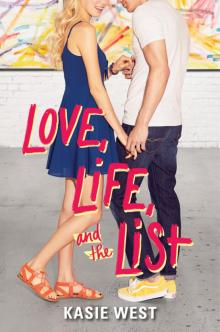 Love, Life, and the List
Love, Life, and the List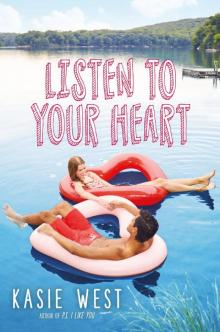 Listen to Your Heart
Listen to Your Heart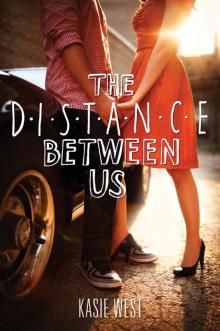 The Distance Between Us
The Distance Between Us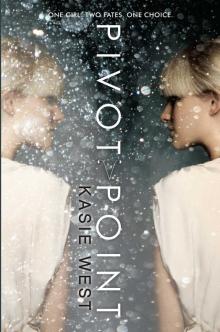 Pivot Point
Pivot Point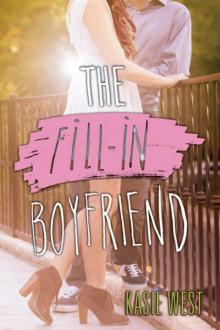 The Fill-In Boyfriend
The Fill-In Boyfriend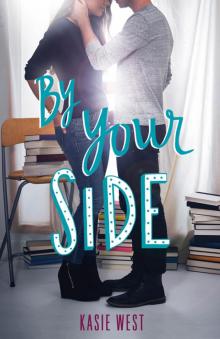 By Your Side
By Your Side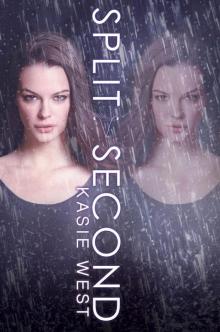 Split Second
Split Second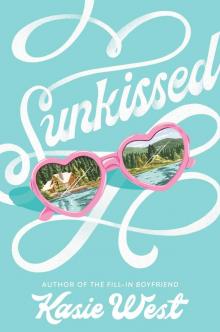 Sunkissed
Sunkissed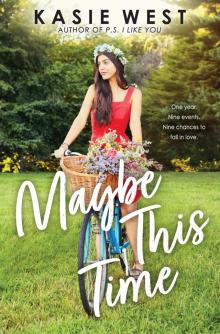 Maybe This Time
Maybe This Time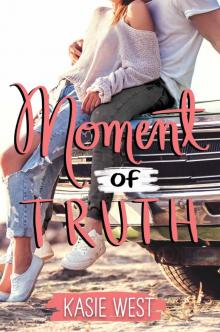 Moment of Truth
Moment of Truth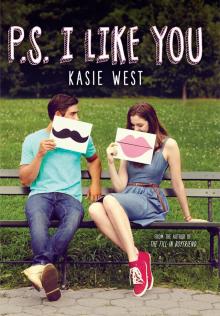 P.S. I Like You
P.S. I Like You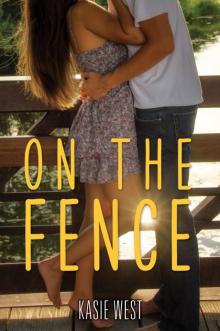 On the Fence
On the Fence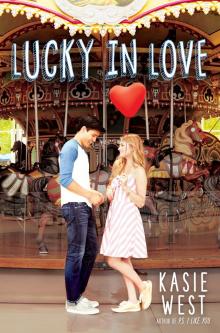 Lucky in Love
Lucky in Love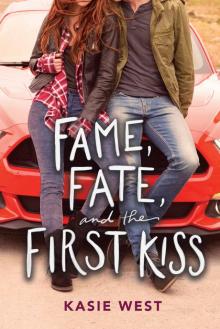 Fame, Fate, and the First Kiss
Fame, Fate, and the First Kiss